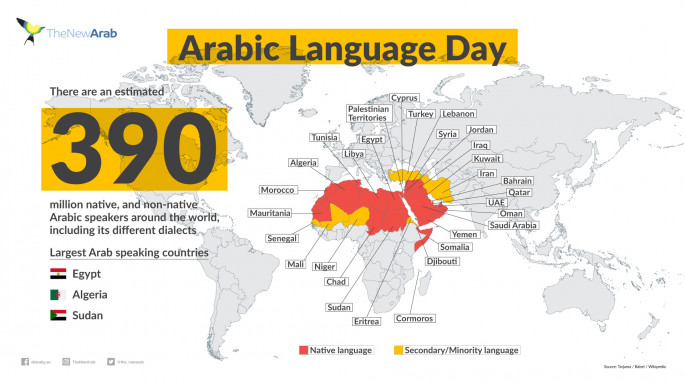Students remember joys of learning Arabic on UNESCO's World Arabic Language Day
Students remember joys of learning Arabic on UNESCO's World Arabic Language Day
UNESCO says it will work with academics to see how Arabic can best be preserved for future generations.
3 min read
Arabic is spoken by more than 290 million people worldwide [Getty]
Arabic, a language spoken by more than 290 million people, is being celebrated on Friday with World Arabic Language Day.
The global event, set up by the United Nations Educational, Scientific and Cultural Organization (UNESCO), recognises the impact of the language that Arabic has had on human history and civilisation. The date of December 18 coincides with the day in 1973 when the UN General Assembly adopted Arabic as the world body's sixth official language.
"Arabic is a bridge between cultures and across borders - a true language of diversity. On this international day, UNESCO will celebrate and explore the role of Arabic Language academies," UNESCO's Director-General, Audrey Azouley, said in a statement. "Not only do these institutions preserve, enrich, and enhance the Arabic language, they also help monitor its use in conveying accurate information in the context of global current events."
While Arabic is the official or co-official language in 25 countries across the globe, the language's appeal stretches far beyond this. From America to Australia, and from Morocco to Indonesia, Arabic holds huge significance for the world's 1.5 billion Muslims who recite daily prayers and scripture in classical Arabic.
Arabic is often considered a tough language to learn due to its complex grammar structure and its plethora of spoken dialects. The 15th letter of the Arabic alphabet, for instance, (Ḍād) [ض], is a sound that is found in no other language; and there are at least 30 Arabic dialects in existence. Nonetheless, non-native speakers around the world continue to take up learning Arabic every day.
Ella Linskens, a UK-based Arabic teacher, began her Arabic learning journey more than six years ago and has not looked back since.
"I'm always reminded of the saying: Arabic takes seven years to learn and a lifetime to master. But a learner is rewarded every step of the way, as more and more of the language opens up to them," Linskens, who recently embarked on teaching Arabic as a full time career, told The New Arab.
"Most of my students are driven by their love and desire to understand the Noble Qur'an. Of course, being able to have a conversation in Arabic, or when travel reopens, to test out phrases on the streets of the Middle East is a huge joy."
Read also: The future is bright for the Arabic audiobooks industry
Linskens' Arabic journey has included many travels, including to the School of Oriental and Arabic Studies in London and the an-Najah University in Nablus.
But while the coronavirus pandemic has brought travel to a halt and limited many activities, language learning seems to have continued unabated.
Ibrahim Salman, an English and Arabic language teacher based in Aswan, southern Egypt, says coronavirus restrictions may actually have increased demand. With the spread of the Internet and a range of video conferencing apps now available, learners now need not leave their homes to pick up a new language.
"My teaching actually increased during the pandemic, as people have a lot of time at home and are using their time to learn," Salman told The New Arab. "I have had many new students since the start of the pandemic, with some of my old students increasing the number of lessons they're taking."
The global event, set up by the United Nations Educational, Scientific and Cultural Organization (UNESCO), recognises the impact of the language that Arabic has had on human history and civilisation. The date of December 18 coincides with the day in 1973 when the UN General Assembly adopted Arabic as the world body's sixth official language.
"Arabic is a bridge between cultures and across borders - a true language of diversity. On this international day, UNESCO will celebrate and explore the role of Arabic Language academies," UNESCO's Director-General, Audrey Azouley, said in a statement. "Not only do these institutions preserve, enrich, and enhance the Arabic language, they also help monitor its use in conveying accurate information in the context of global current events."
While Arabic is the official or co-official language in 25 countries across the globe, the language's appeal stretches far beyond this. From America to Australia, and from Morocco to Indonesia, Arabic holds huge significance for the world's 1.5 billion Muslims who recite daily prayers and scripture in classical Arabic.
|
||
Ella Linskens, a UK-based Arabic teacher, began her Arabic learning journey more than six years ago and has not looked back since.
"I'm always reminded of the saying: Arabic takes seven years to learn and a lifetime to master. But a learner is rewarded every step of the way, as more and more of the language opens up to them," Linskens, who recently embarked on teaching Arabic as a full time career, told The New Arab.
"Most of my students are driven by their love and desire to understand the Noble Qur'an. Of course, being able to have a conversation in Arabic, or when travel reopens, to test out phrases on the streets of the Middle East is a huge joy."
Read also: The future is bright for the Arabic audiobooks industry
Linskens' Arabic journey has included many travels, including to the School of Oriental and Arabic Studies in London and the an-Najah University in Nablus.
But while the coronavirus pandemic has brought travel to a halt and limited many activities, language learning seems to have continued unabated.
 |
Ibrahim Salman, an English and Arabic language teacher based in Aswan, southern Egypt, says coronavirus restrictions may actually have increased demand. With the spread of the Internet and a range of video conferencing apps now available, learners now need not leave their homes to pick up a new language.
"My teaching actually increased during the pandemic, as people have a lot of time at home and are using their time to learn," Salman told The New Arab. "I have had many new students since the start of the pandemic, with some of my old students increasing the number of lessons they're taking."
This year's Arabic Language Day runs under the theme: 'Arabic Language Academies: Necessity or Luxury?', with an emphasis on how classical Arabic can be preserved and promoted amid growing dominance of English and French in academic institutions.
UNESCO says it will be showcasing the rich history of Arabic and holding online meetings with academics to see how the language can best be preserved for future generations.
Follow us on Facebook, Twitter and Instagram to stay connected


![Minnesota Tim Walz is working to court Muslim voters. [Getty]](/sites/default/files/styles/image_684x385/public/2169747529.jpeg?h=a5f2f23a&itok=b63Wif2V)




![An Israeli air strike on Jabalia killed teenage journalist Hassan Hamad [Screengrab/X]](/sites/default/files/styles/image_330x185/public/2024-10/hassan%20hamad1.jpg?h=c12e0b96&itok=Rd_dyCVp)

![Israeli strikes on Beirut [Getty]](/sites/default/files/styles/image_330x185/public/2176155077.jpeg?h=a5f2f23a&itok=Xq7ypWgM)